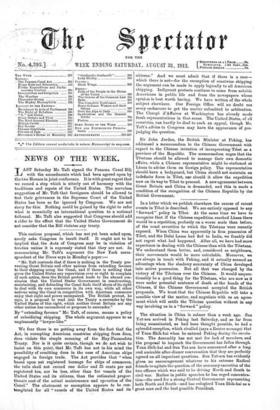This curious proposal, which has not yet been acted upon,
surely asks Congress to insult itself. It ought not to be ipiplied that the Acts of Congress may be in violation of treaties unless- it is expressly stated that they are not. In summarizing Mr. Taft's argument the New York corre- spondent of the Times says in Monday's paper:— "Mr. Taft contends that if there is nothing in the Treaty pre- venting Great Britain and other nations from extending favours to their shipping using the Canal, and if there is nothing that gives the United States any supervision over or right to complain of such action, then the British protest leads to the absurd con- clusion that the United States Government in constructing, maintaining, and defending the Canal finds itself shorn of its right to deal with its own commerce in its own way, while all other nations using-the Canal in, competition with American commerce enjoy that right and power unimpaired. The British protest, he says, is a proposal to read into the Treaty a surrender by the -United States of this right, which neither Great Britain nor any other nation has surrendered or proposes to surrender."
By " extending; favours " Mr. Taft, of course, means a policy of subsidizing shipping. The whole argument appears to us unpleasantly "lawyer-like."


































